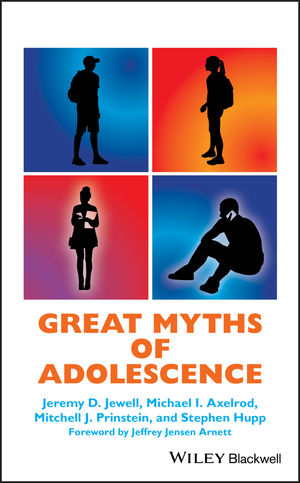 In a new book dedicated to “teens everywhere who are working to understand who they are and how they fit in the world,” two Southern Illinois University Edwardsville psychology professors use evidence-based science to shed light on 50 widely held misconceptions related to adolescence.
In a new book dedicated to “teens everywhere who are working to understand who they are and how they fit in the world,” two Southern Illinois University Edwardsville psychology professors use evidence-based science to shed light on 50 widely held misconceptions related to adolescence.
Great Myths of Adolescence offers important guidance for teenagers, parents, psychologists, educators and others by shattering stereotypes and exploring myths related to sex, technology, drugs and self-control.
Among the myths debunked:
- Greek life has a negative effect on college students academically
- The millennial generation is lazy
- Peer pressure only causes teens to make bad decisions
 Myth busting psychology professors Jeremy Jewell, PhD, and Stephen Hupp, PhD, co-wrote the book along with professors at two other universities: Michael Axelrod, PhD and Mitch Prinstein, PhD. The eye-opening book presents the latest research intertwined with pop culture references from movies and television shows like Mean Girls, Twilight, Glee and South Park.
Myth busting psychology professors Jeremy Jewell, PhD, and Stephen Hupp, PhD, co-wrote the book along with professors at two other universities: Michael Axelrod, PhD and Mitch Prinstein, PhD. The eye-opening book presents the latest research intertwined with pop culture references from movies and television shows like Mean Girls, Twilight, Glee and South Park.
“Many adults in society have an ‘us versus them’ bias toward teens and assume that ‘teens these days’ have many more problems than they did when they were that age,” said Jewell. “But in reality, teens have a great many strengths and at times have fewer problematic behaviors than adults. For example, sexting and marijuana use is much more common in middle-aged adults compared to teens.”
“This is the type of information we’ve been teaching in our Clinical Child and School Psychology graduate program for years,” said Hupp. “We thought it was time to help a broader audience learn how to separate fact from fiction when it comes to adolescence.”
Noted expert in emerging adulthood Jeffrey Jensen Arnett acknowledges humans’ persistent desire to believe appealing stories regardless of factual evidence. It’s that “immutable attraction” that makes works like Great Myths of Adolescence essential, he says.
“I hope other readers will find, as I did, that even though it is never pleasant to have to admit you were wrong, there is satisfaction to be had in discarding false beliefs in favor of the facts,” Jensen Arnett wrote in the book’s foreword. “By shattering many of these stereotypes, this book offers a sympathetic, encouraging and -most important of all – reality-based portrayal of today’s adolescents.”
Great Myths of Adolescence is a sequel to Jewell and Hupp’s first book, Great Myths of Child Development, both part of the Great Myths of Psychology series. The book is available now on Amazon.com.
Photos: Great Myths of Adolescence
Myth busting psychology professors (L-R) Stephen Hupp, PhD, and Jeremy Jewell, PhD.